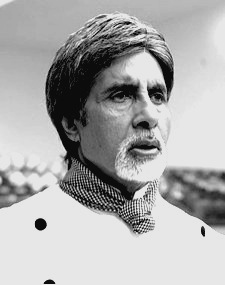I’m sure a great number of you saw The Great Gatsby, but I’d bet dollars to donuts that most of you weren’t aware that you were watching arguably the biggest movie star in the history of cinema as you did. If you’re now mentally patting your boy Leonardo DiCaprio on the back for being the biggest movie star in the history of cinema, you’re going to want to sit down for this one: he’s not. In fact, the star I speak of played a much smaller role and would likely have been entirely unfamiliar to you. The man with the stylish goatee was Amitabh Bachchan and he’s the biggest movie star in the history of cinema.
Amitji, as he is respectfully referred to as by his fans, ruled the Bollywood world in the seventies and encountered no threats to his crown. With long limbs and a vibrancy fit to fall in love with, he played the swashbuckling Angry Young Man in a now-classic film. The Angry Young Man was a character society had somehow wronged that grew into a man determined to see that wrongs were righted, usually by less than acceptable) means. He is similar, in some ways, to an anti-hero. This character trope is my very favorite, thanks in large part to Amitabh’s always earnest and engaging performances.
If you’d like to see a softer side of the towering megastar, give Anand (1971) a try. Amitabh won a Filmfare for his portrayal of a doctor whose life is changed by a terminally ill patient. Maybe that’s not striking your fancy either. Amitabh has made more than one hundred films—in that filmography, you’re guaranteed to find something you like.
Big B—Amitabh’s popular nickname—has a gift for humor. This talent is especially evident in several scenes in the 1977 film Amar Akbar Anthony. I mentioned the song “My Name is Anthony Gonsalves” last week and if you didn’t check it out then, just get your hands on that film now. The song and the two scenes following it are comedic gold.
In 1982, Amitabh was injured while filming Coolie. The reaction of the Indian audience while he fought for his life is incomparable to anything in American film history. His accident and recovery even caused the director of the film to change the film’s intended ending, although I won’t say how as we are a spoiler free community. Rumor has it that a title card interrupts the fight scene he was injured shooting indicating to the audience that this scene was the one that caused his accident.
Amitabh’s fame has not diminished in the following decades and neither has his talent. His more recent hit performances include his role in Black for which he won three awards. Black is a story of a deaf-mute woman that takes cues from Helen Keller’s biography. Amitabh plays the woman’s teacher and is lively, powerful, and full of emotional depth onscreen.
In Cheeni Kum, Amitabh plays a chef who courts a much younger woman. My friend Jana Brookshier, a studier of Indian film and culture who nurtured my love for both, contextualizes this film much better than I could: “A man who has played countless actions heroes, crime lords, and the occasional melodramatic lover suddenly performs in an understated modern romantic comedy. His dry, almost sardonic sense of humor may surprise you if you’re familiar with his other work. But the honesty with which he fills the role is somehow heartwarming. Oh, who am I kidding. He’s deeply sardonic.” She acknowledges, as one must, Amitabh’s multi-faceted talent. Though he gained his fame by single-handedly creating a character type, he is more than capable of working outside that trope.
I am woefully unable to fully describe Amitabh or his filmography in this article for you. There simply aren’t enough words or transition techniques. Alas, what I have been able to communicate shall have to suffice and I do bid you to watch as much of Amitabh’s filmography as you can in your busy, busy lives. Enjoy Big B, Millikids, and feel any lingering love you had of Chuck Norris transfer to a much worthier candidate.

